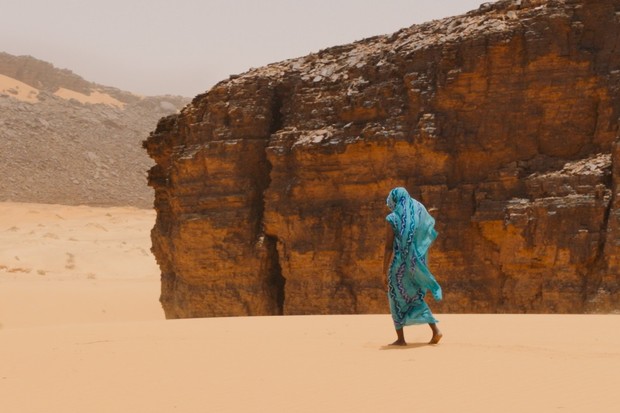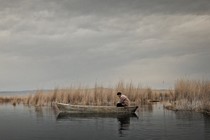Review: Sira
- BERLINALE 2023: Apolline Traoré's Panorama Audience Award-winning film transcends the limits of its rape-revenge premise with a broad political background and intense acting

Despite not sounding like a big favourite on paper, it is easy to see why Burkinabé director Apolline Traoré's Sira [+see also:
trailer
interview: Apolline Traoré
film profile] has won the Berlinale's Panorama Audience Award for a fiction film (see the news). Set in an exotic location with a fierce African woman as a protagonist who fights back against all odds, the straight-forward narrative with an urgent, political background that requires little exposition, and the fact that it is a rare African audience-friendly film to break out internationally, could be major selling points for a daring distributor.
The title character, played by Nafissatou Cissé, is a member of a nomadic Fulani tribe, and we find her travelling with her family on camels through the Sahel. Even though this vast sub-Saharan region spreads from one coast of the continent to another, the viewer can piece together that we are probably somewhere between Mali and Burkina Faso.
This Muslim tribe is headed towards a village where Sira is set to marry a Christian farmer, Jean-Sadi (Abdramane Barry). When Moustapha (Mike Danon) confronts her father, tribe chief Tidiane (Seydou Diallo), about it, he argues back, saying that love is the most important thing, and moreover, in the village, they would be protected from militias and terrorists that rule the region.
But they don't get far before one such group attacks them, killing the men, with the boss Yere (Lazare Minoungou) raping Sira and leaving her in the desert. But she survives and manages to reach the terrorists' camp, stealing food and water at night and hiding among the unforgiving rocks during the day.
Here we are introduced to the terrorist cell: it is never mentioned by name, but Yere has an ISIS flag hanging in his tent. The old, experienced Karim (Ildevert Meda) is bringing in weapons and training recruits, while Moustapha re-emerges as a power-hungry opportunist. A group of women are brought in as sex slaves, and Sira manages to get them to help her but also learns she is pregnant. The size of her belly will serve as our time marker, and if this takes her to Medea territory, we will only find out at the end, in a tense, explosive scene that wouldn't be out of place in a US action flick.
Traoré has devised the story in a way that is both clever and honest. The audience doesn't need to know details about this complicated region, or its tribal and religious allegiances: it is a straight-forward narrative with easily recognisable themes and clear interpersonal dynamics. The bright colours Siri wears are contrasted by the black chadors of scared and scarred women whom the terrorists abuse, with a particularly brutal scene involving the young, frightened but brave Kemi (Ruth Werner).
The director paints the heroes and the villains equally economically, with Danon's Moustapha being the most troubled and conflicted character. Barry's Jean-Sadi turns out to be quite useless, proving that Sira would be able to protect him, rather than the other way around. It is Cissé who grabs the audience with her all-out performance, making the film more poignant than a simple rape-revenge set-up, and while some of the actions the screenplay lays on her require suspension of disbelief, the actress's transformation largely offsets this.
Traoré and DoP Nicolas Berteyac devise multi-layered desert scenes that require the complex choreography of numerous characters, animals and vehicles that populate the wide shots, and editor Sylvie Gadmer deftly combines them with intense close-ups, particularly those of Sira and Moustapha. Cyril Morin's mostly well-distributed score similarly alternates between dramatic percussion and wistful woodwinds.
Sira is a co-production between Burkina Faso's Les Films Selmon, France's Araucania Films, Germany's One Fine Day Films and Senegal's Dakar Film. Wide Management has the international rights.
Did you enjoy reading this article? Please subscribe to our newsletter to receive more stories like this directly in your inbox.




















